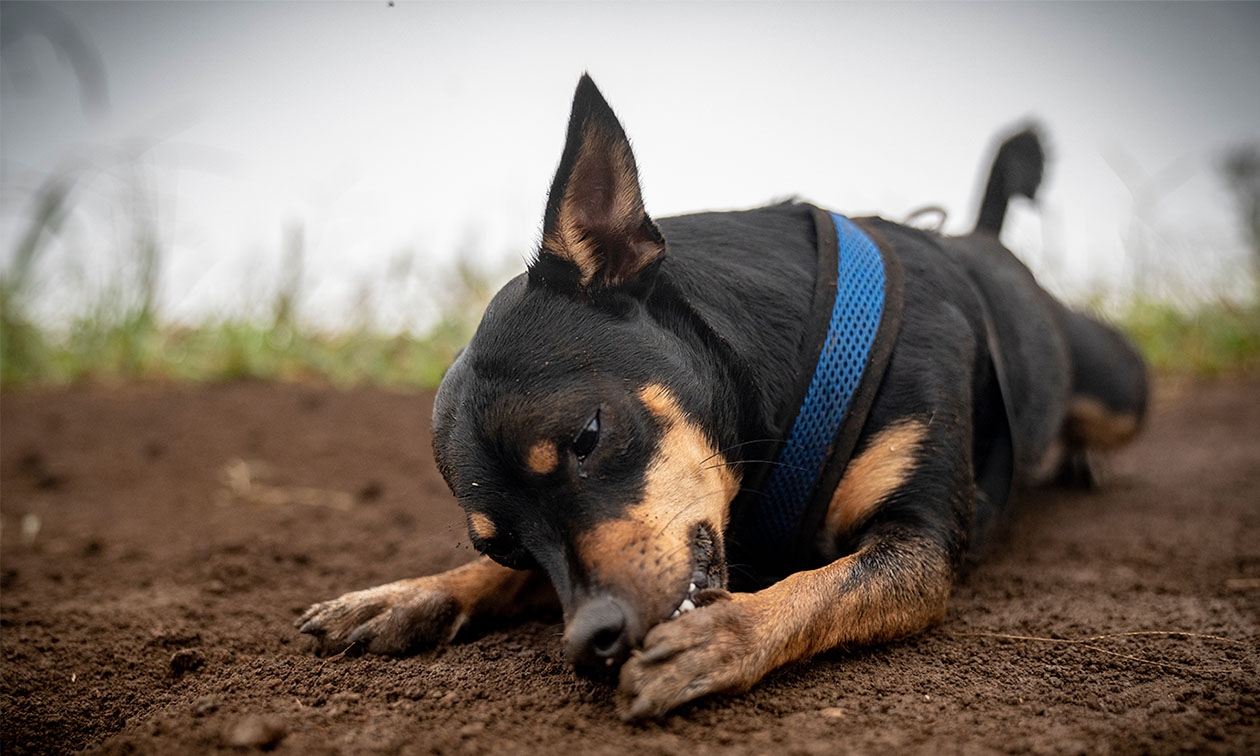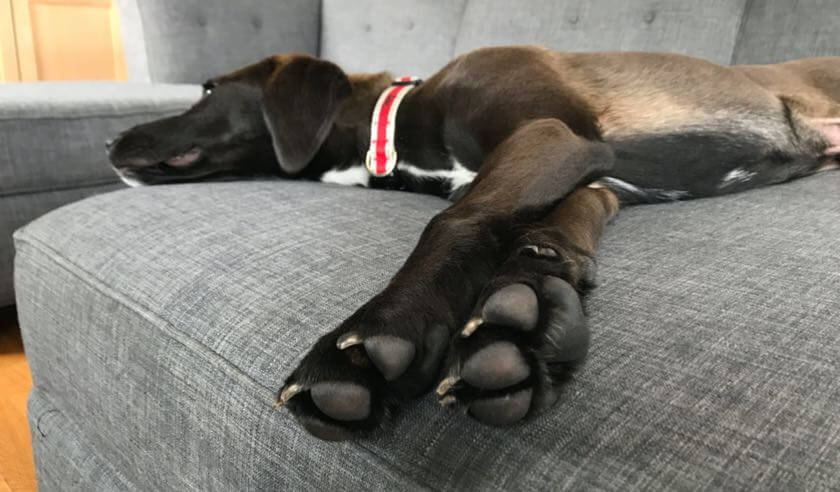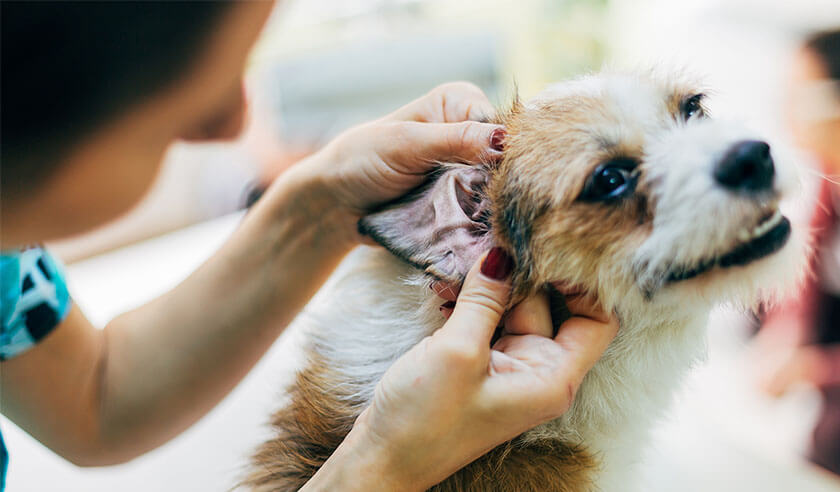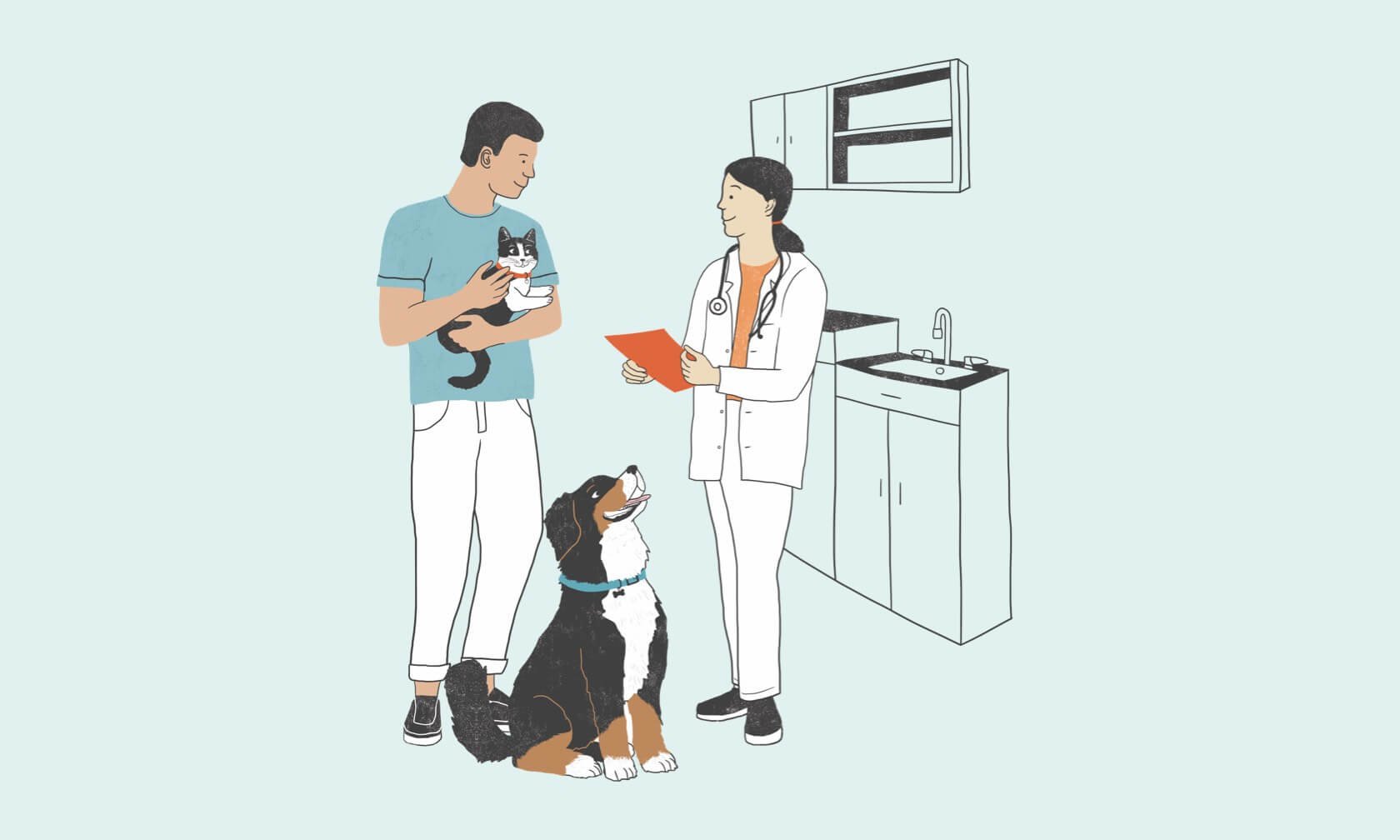It can be completely normal for dogs to chew and lick their paws occasionally. The challenging part is determining when the licking is excessive and causing sores on your dog’s feet. When it becomes excessive, obsessive, or you notice other changes in their behavior, there may be something going on that needs your attention and time to take your dog to the veterinarian.
Why Do Dogs Chew Their Paws?
Dogs naturally chew their paws for lots of reasons— grooming, scratching, to get rid of something caught in the fur or between the toes, or when their nails are too long. In these instances, your dog should stop chewing on their own, or you can intervene with grooming.
Why Do Dogs Lick Their Paws?
Paw licking is a normal and common behavior among dogs. Your dog may be licking their paws to clean off dirt or residue, or to alleviate irritation. For some dogs, paw licking is a self-soothing behavior.
When Paw Licking and Chewing Aren’t Normal
Normal licking and chewing are easy to stop by calmly interrupting your dog and giving them something else to do. You shouldn’t notice any other issues with their behavior or mobility.
If your dog is suddenly chewing or licking more often than usual, it’s hard to distract them and keep them from going back to their paws, or you notice other changes like favoring one leg, whimpering, or being less active, it’s time to investigate. There may be something more serious happening.
Diagnosing the Cause of Paw Chewing and Licking
Since many causes of excessive paw chewing and licking have similar clinical signs, diagnosing the problem can be difficult so you’ll need a veterinarian to work with you to determine the cause.
Your veterinarian will need a detailed medical history. They may ask questions like:
- When did the behavior start?
- How has it progressed?
- What other signs have developed?
- What changes have occurred in your dog’s environment?
- What type of diet is your dog on?
- Have there been any changes in diet or treats?
- Is your dog on any parasite preventatives?
- What shampoos and conditioners do you use?
- What laundry detergent is used to wash their bedding?
- Has your dog been in contact with any chemicals inside or outside the home?
- Has your dog traveled anywhere?
- Has your dog been in contact with any other animals?
- Does your dog show signs of being stressed or anxious?
- How much exercise and mental enrichment does your dog get?
- Is your dog licking, itching or losing hair anywhere else on their body?
After your veterinarian has a complete history and performs a physical examination, they may recommend diagnostic tests like:
- Complete blood count
- Blood chemistry
- Urinalysis
- Fecal analysis
- Cytology/impression smear
- Skin scrape
- Biopsy
- Radiographs
- Allergy testing
- Allergic itch medication
All of this can help your veterinarian determine the cause of the extra attention your dog is paying to the paws and develop a treatment plan.
Causes and Possible Treatments for Your Dog’s Excessive Paw Chewing and Licking
Several problems can cause a dog to chew and lick their paws. Treatment depends on the cause.
Allergies
Dogs with seasonal, environmental, or food allergies commonly chew and lick their paws due to itching.
Other clinical signs include skin redness and inflammation, recurrent infections of the skin and ears, intense itching on other body parts, digestive issues such as diarrhea and vomiting.
Treatment for a pet with allergic itch can be an ongoing challenge, but your veterinarian can help you manage your dog’s allergies. Treatment will depend on the allergy.
- Environmental (seasonal and non-seasonal) allergic itch can be managed with medications. Along with medications to help the itch, pets may get secondary skin infections and irritations that may require antibiotics, sprays or shampoos. Allergy testing is also an option to determine the cause of your dog’s allergic itch. Your veterinarian will be able to recommend the best course of action to make your pet feel better.
- Food allergies are often treated by eliminating the allergen from the diet, which is the protein component of the diet. Food allergies can be challenging when determining exactly which protein your pet is allergic to and sometimes your veterinarian may combine a food trial along with medications to help control the itch.
Additional Skin Issues
Irritation and swelling can occur at the paw due to things like skin infection from yeast and bacteria, a foreign body in the fur or skin, tumors, or chemicals. This can cause itching and discomfort. Sometimes a yeast and bacterial infection can be secondary to an allergy that gets infected, and this can cause the area to become even more itchy.
Clinical signs may include redness, swelling, hair loss, discharge, lesions (crusts and scabs), ulcers, lumps, pain, and limping. Your dog’s feet may have a strong or unusual odor.
Treatment is based on the cause of the skin issue.
- Bacterial infections need antibiotic treatment. For moderate to severe cases, treatment with medicated wipes or shampoos, anti-inflammatories, and pain medications may also be needed.
- Mild yeast infections may be managed with topical products. Serious cases may need oral anti-fungal medications.
- Chemical burns may require antibiotics, topical medications, and pain meds.
- Skin issues caused by a tumor may require surgery and medical management.
Parasites
The area between your dog’s toes may be a place for ticks to hide, and sometimes fleas can affect this area too. Mites, such as demodicosis or scabies, will also affect a dog’s paws. Any of these parasites may cause dogs to chew and lick their paws.
Other signs of parasites include redness, swelling, hair loss, crusty and scaly skin, bleeding, pain, and limping. Your dog may also have these signs in other areas of the body.
Treatment for fleas and ticks involves routine year-round use of flea and tick preventatives. This is especially important for dogs who also have flea allergies.
If mites are the cause, your veterinarian will recommend the best treatment for them depending on the type.
Pain
Licking due to pain can result from many issues, such as arthritis pain in the paw or leg, tumors, a foreign body, skin issues, injury, or even pain elsewhere in the body.
Clinical signs of pain include limping, swelling, reluctance to walk, bleeding, and behavioral changes like sleeping habits and loss of appetite.
Treatment is based on the cause of the pain.
Injury
Dogs can injure their paws in various ways, like torn, cracked, or overgrown toenails, abrasions, cuts, punctures, dry and cracked pads, physical trauma, or a foreign body. Any injury, even those that seem minor, can cause a dog to chew and lick their paw.
Clinical signs of a paw injury include swelling, bleeding, bruising, abnormal nails, limping, pain, abnormal shape of the paw, and inability to bear weight on the paw.
Once again, treatment is based on the cause and severity of the injury.
Behavioral Issues
Dogs who are bored or have behavioral issues such as anxiety can chew and lick their paws as a form of stimulation or a way to soothe themselves. Sometimes they will even lick and bite their feet so much that they get infected and sore.
Signs your dog may be bored include:
- Destructive or excessive chewing
- Digging
- Excessive barking
- Restlessness
- Jumping on people
- Circling
Signs of canine anxiety include:
- Panting
- Trembling
- Pacing
- Drooling
- Destructive behavior
- Clinginess
- Irritability
- Reactivity
- Aggression
- Withdrawn behaviors
Your veterinarian should rule out medical issues even if your dog shows signs of boredom or anxiety. You can also work on increasing physical and mental exercise and trying to figure out what could be causing stress.
It’s helpful to increase their daily activities to include more walks, play, and enrichment.
For anxiety, your veterinarian may suggest medications or calming supplements. You should also consider working with a certified dog training and behavior expert to help you identify the cause of the behavioral issues and develop a behavior plan to help your dog feel better.
ZPC-04113





